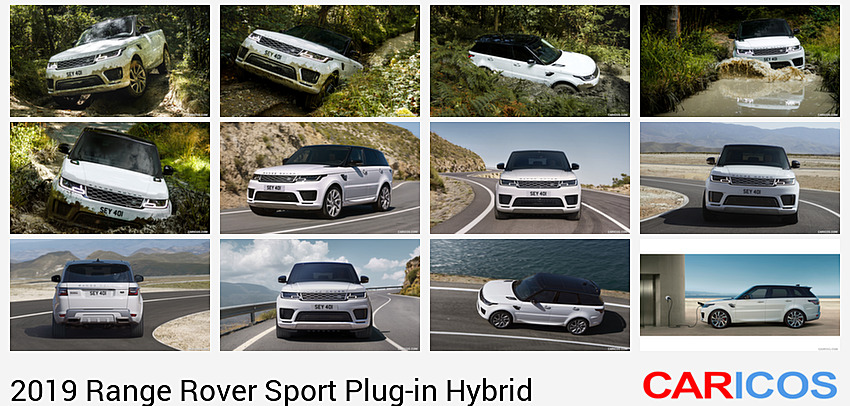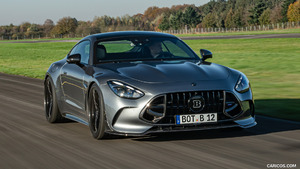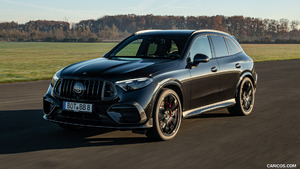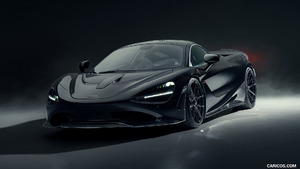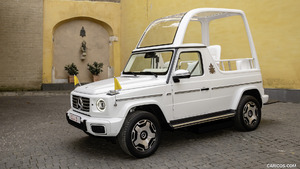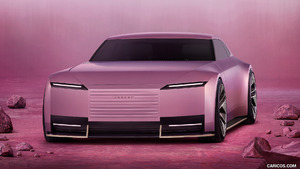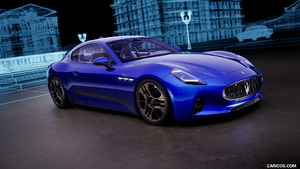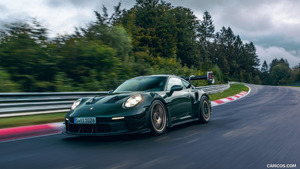2019 Range Rover Sport Plug-in Hybrid
The new Range Rover Sport embodies the pioneering spirit inherent in every Land Rover vehicle and now delivers sustainable performance and efficiency with the introduction of plug-in gasoline-electric power for 2019MY. The highly capable and dynamic performance SUV features the first Plug-In Hybrid Electric Vehicle (PHEV) powertrain from Jaguar Land Rover and is capable of making trips of up to 31 miles (51km) with zero tailpipe emissions when driven in all-electric mode1.
Plug-In Hybrid Electric Vehicle
The 2019 PHEV model, badged P400e, combines an advanced 296hp four-cylinder Ingenium gasoline engine with a 114hp (85kW) electric motor. This transformational technology is powered by an advanced 13.1kWh lithium-ion battery giving a total available power output of 398hp from the permanent four-wheel drive (4WD) system7.
Together they drive the brand’s performance SUV from 0-60mph in just 6.3 seconds (0-100km/h in 6.7 seconds) and to a top speed of 137mph3. With an impressive 472-lb. ft. of torque, the new powertrain mixes dynamic and sustainable performance with traditional Range Rover capability, comfort and refinement.
The combination of Ingenium gasoline and electric power can be used in two driving modes: Parallel Hybrid mode (the default driving mode) and EV (Electric Vehicle) mode.
In Parallel Hybrid mode the PHEV model can intelligently and seamlessly combine the two power sources to deliver efficient progress. By using its electrical energy reserves intelligently the P400e is able to offer the power and capability customers demand from a Range Rover Sport.
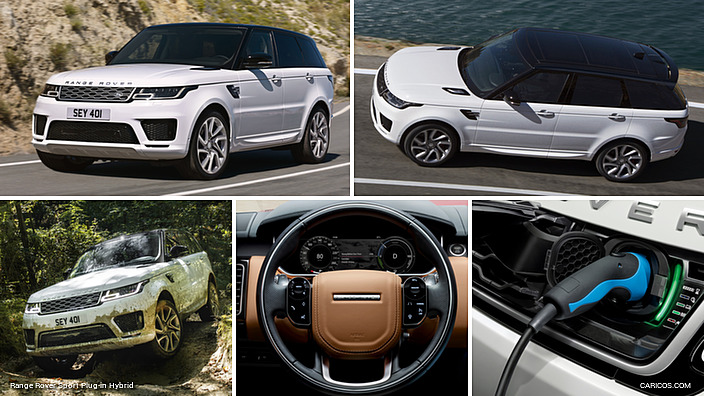 2019 Range Rover Sport Plug-in Hybrid
2019 Range Rover Sport Plug-in Hybrid
On longer journeys, customers can use the SAVE function to deploy the EV-only range for a specific part of their journey, for example, when entering congested urban areas, while the Predictive Energy Optimization function uses the vehicle’s Navigation system to maximize fuel efficiency.
In EV mode the P400e can be driven up to 31 miles (51km) with zero-emissions when fully charged1. This driving mode is manually selected using a button on the console and gives the new PHEV model a top speed of 85mph (137km/h).
The intelligent system can also capture and store the energy generated when braking to help recharge the battery.
The 2.0-liter Ingenium engine can be found under the clamshell hood, with the 85kW electric motor housed on the transmission, at the center of the vehicle.
The access point for the 7kW on-board charging socket is located behind the Land Rover badge to the right of the grille, at the front of the vehicle, while the 13.1kWh prism-shaped lithium-ion battery is mounted at the rear beneath the trunk floor.
Charging
The new PHEV model features a plug-in charge point behind a discreet panel on the grille, a 7kW on-board charger, and a charging cable. Based on market and type of hardware used, the Range Rover Sport P400e is suited to deliver full battery charging overnight using a domestic plug socket.
The PHEV model is available with three types of cables and includes a home charging lead, which connects to domestic power supplies, as standard.
The public charging cable, which is compatible with AC wall boxes installed at domestic and business premises and service stations, makes it ideal for charging on the move.
Timed charging is also available via the vehicle’s infotainment system, which allows owners to choose the most appropriate time to begin charging – perfect for customers who want to plug in when they return home, but want to wait until a less costly energy price is available.
Owners can monitor the charging status via two illuminated strips that sit either side of the charging socket behind the grille. A white light signifies the vehicle is connected but indicates that charging has not started, while a blue light shows that timed charging is set but not underway. A flashing green signal shows the car is charging, while a solid green light indicates the battery is fully charged.
When customers are away from their vehicle, they can use the InControl Remote app to monitor the charge status, as well as receive an alert if there is an error, or the cable has been removed forcibly.
Functionality
The gasoline engine and electric motor of the P400e have been calibrated to work in harmony regardless of the state of battery charge, with two charge management functions available when driving in Parallel Hybrid mode.
Predictive Energy Optimization helps to make the most of both power sources and is activated when the driver enters a destination into the navigation system. By analyzing factors such as traffic conditions, gradient of the route and whether it is an urban or rural environment, the PHEV system will seamlessly combine electric and Ingenium gasoline engine power to optimize efficiency.
In addition, the driver-selectable SAVE mode, accessed through the touchscreen, maintains battery charge at the point of activation. At this point, the vehicle will only use the electric motor once it has replenished enough energy via regenerative braking or charging, allowing customers to conserve electric power to be used on a specific part of their journey.
The operation of the PHEV powertrain is supported by the latest ZF eight-speed automatic transmission, which combines lightweight construction and highly efficient operation to reduce fuel consumption while delivering the supreme refinement and keen responses expected from the Range Rover Sport. The advanced transmission adapts to suit individual driving styles, so dynamic driving is automatically accompanied by quicker gear changes.
DESIGN
“The new Range Rover Sport features well-considered updates that reinforce its assertive and powerful design. The vehicle has evolved into a unique statement of performance, while the refined appearance speaks to the modernity of our Range Rover family.”
Gerry McGovern, Chief Design Officer at Land Rover
Enhanced exterior
The exterior design of the Range Rover Sport has been enhanced to underline its dynamic character. These design enhancements harmonize and modernize its purposeful appearance, while new slimline headlights and rear light clusters sharpen the vehicle’s attitude.
The striking new lights and slimmer grille blend into a clean, single surface, complemented by an updated front bumper with slimmer LED fog lights.
This new bumper design creates a more planted, ground-hugging aesthetic that also improves airflow for enhanced cooling. The design of the fender vents is also more assertive than before while the floating roof helps create a long and lean profile.
At the rear, a new more aggressive slotted spoiler profile complements the vehicle’s clean, efficient design, while significantly reducing the accumulation of dirt on the rear windshield.
Three new alloy wheel options underline the vehicle’s purposeful attitude, by accentuating its athletic stance. The 21- and 22-inch designs are available with a silver, diamond-turned or black finish.
Customers looking for an even more purposeful vehicle can opt for the new Black Exterior Pack for Supercharged Dynamic models. This adds Gloss Black exterior accents, including the grille mesh and surround, to give the Range Rover Sport a stealth-like appearance.
The addition of a new Carbon Fiber Exterior Pack, available as an option on HSE Dynamic, Supercharged Dynamic and Autobiography models, adds a high-performance edge with Gloss Black and Carbon Fiber additions to the main grille, fender vent and hood vent surrounds, as well as the door mirror covers and tailgate finisher. Customers can also choose a new Byron Blue metallic paint.
The introduction of LED headlight technology gave the Land Rover design team greater flexibility and the opportunity to develop a sharper new headlight design, while also providing superior illumination.
The standard Premium headlight package has 24 LEDs per vehicle, with Signature Running Lights and optional Auto High Beam Assist.
Interior changes
“The clean uncluttered lines of the interior give the feeling of inner strength – the sports command driving position allows drivers to enjoy the sporting prowess of the vehicle. The infotainment system reduces the visual clutter, making it an even more intuitive and a user-friendly environment.”
Gerry McGovern, Chief Design Officer at Land Rover
New Ebony/Vintage Tan and Ebony/Eclipse colorways are available in the luxurious cabin. Semi-Aniline Leather, previously only available in the full-size Range Rover, is now standard on HSE Dynamic and Autobiography Dynamic trims.
Slimmer front seats have been introduced for improved support via new foams, trims and interlayers, providing enhanced comfort and a more detailed appearance. Grained leather upholstery is available with eight-way adjustable front seats, as well as the 14-way and 14-way memory designs. Perforated Windsor leather comes with the 16-way memory front seats and the 16-way seats fitted with winged headrests.
New interior ambient lighting highlights key design cues throughout the cabin with as many as 10 different color options available. The atmospheric set-up bathes the footwalls, sections of the doors and other parts of the interior in light, creating a cosseting and relaxing cabin.
Passengers also benefit from a series of flexible new storage solutions, such as cup holders that can be removed to reveal a deep new 195-cu. in. (3.2-liter) storage area in the center console with dedicated USB charging port.
In addition, the 475-cu. in. (7.8-liter) cubby box (up from 5.8 liters) features a new double-level hinged tray when open, perfect for keeping wallets and mobile phones secure and out of sight. The lockable glove box provides enhanced security, while customers can specify an optional cooler compartment or a new refrigerator in the front center console, to provide the luxury of cooled drinks on demand. The fridge is capable of holding four 16.9-fl. oz. (500ml) bottles and chilling to 41⁰F (5⁰C) with the ability to perform a ‘rapid cool’ to quickly chill drinks.
Air quality
A new cabin air ionization system, called Nanoe™, is central to the increased focus on passenger comfort. The system ionizes particles in the air, allowing them to attach to surfaces thus helping to cleanse the cabin air. It can be switched on or off via the Climate screen.
Gesture sunblind
Convenience-boosting technology is at the heart of the new Range Rover Sport, as exemplified by the powered roof sunblind, which can be opened and closed using an advanced gesture control system capable of sensing the movement of a hand.
All it takes to open the sunblind is a rearward swipe in front of the rear-view mirror, while a simple forward motion will prompt the blind to close. Comfortable and convenient for passengers, this intuitive system also assists in reducing potential distraction of the driver.
In addition, an intelligent function can close the blinds automatically when all passengers have disembarked and the vehicle is locked keeping the interior cool in warm weather. When the driver opens the door, the sunblind will automatically and smoothly slide open. The sunblind can still be operated with conventional buttons, if preferred.
TECHNOLOGY
The Range Rover Sport features the latest suite of available consumer technology including the Land Rover InControl® Touch Pro™ Duo infotainment system, a new head-up display system and added connectivity features5.
Touch Pro Duo
Two high-definition 10-inch touchscreens form the centerpiece of the minimalist cabin of the Range Rover Sport with Touch Pro Duo, the most advanced infotainment system created by Jaguar Land Rover to date at the heart of it. Fast and intuitive, Touch Pro Duo combines finely engineered physical controls and a beautiful digital interface to deliver a truly connected driving experience4.
The system looks simultaneously futuristic and elegant with its interlinked 10-inch touchscreens providing superior clarity and ease of operation with familiar tap, swipe and pinch-to-zoom control gestures on the upper screen. The customizable home screen also allows customers to create shortcuts to preferred features4.
Touch Pro Duo can dual-task for the driver, keeping the mapping information displayed on the upper touchscreen, while providing easy access to further features on the secondary lower screen. By dividing information and controls logically between the two screens, the new Range Rover Sport achieves a more intuitive user experience.
The upper screen on the central console can be angled to counter glare and improve visibility while the fixed lower 10-inch display manages more functional tasks such as the climate control, seat and vehicle settings. This screen can also be used to manage media and phone functionality via specialist widgets when the upper screen is in use.
Key to its design are two rotary Dynamic Dials, which can be used to control the cabin temperature, fan speed, seat climate and massage functions.
Driver interface
Instrumentation is provided by a new 12-inch high-resolution digital display with dual dial, single dial and extended mode views, while other frequently used features – including phone, navigation and media settings – can also be managed using this innovative new cluster.
In addition, a next-generation head-up display system puts vital information just where the driver wants it, using 10-inch full-color projection with superior clarity and definition. It presents essential information on the windshield, keeping vehicle speed and navigation directions in view at all times. Other updates can be also be shown, including adaptive cruise control settings and Advanced Driver Assistance alerts such as signals from the traffic sign recognition system4.
The information appears to hover beyond the windshield thanks to an increased perceived projection distance, to help prevent the driver’s eyes from having to constantly refocus.
The full-color image is generated using four super-bright LEDs and a high-resolution TFT LCD screen. The image is sharp, bright and is large in size, allowing customers to adjust the layout, height and brightness of the display.
The steering wheel controls on the new Range Rover Sport feature intuitive new capacitive switches and dynamic illuminated icons, which configure icons depending on the infotainment media being used. In addition, the advanced controls maintain the minimalist quality of the interior.
The user-friendly switches provide full control of the instrument cluster, with media playback, phone, cruise control and heated steering wheel settings, plus a shortcut to a feature of the driver’s choosing. The capacitive ‘wheel’ also enables scrolling by finger or thumb.
Convenience features
The new Range Rover Sport provides passengers in the second row with an optional 10-inch rear seat entertainment display that includes a touchscreen for the first time to offer enhanced clarity and ease of use.
With up to 14 connection points integrated discreetly throughout the cabin, the vehicle is perfectly equipped as a mobile workspace and entertainment hub. This is thanks to USB, HDMI and 12V connections in the front console storage area and a 12V socket in the glove box. For rear passengers, there is 12V charging, domestic plug socket, USB and HDMI, while the load space also provides 12V and a second domestic plug socket to keep laptops and other devices topped up.
In addition, up to eight 4G Wi-Fi connections are available, which ensure continuous connectivity on the move[v].
The latest online media functionality from Land Rover now allows for the aggregation of numerous content providers and their personalized content – such as Deezer and TuneIn – giving customers access to more than 40 million music tracks and four million on-demand programs and podcasts. For the first time, these can be accessed directly from the vehicle without the need for a smartphone – providing a seamless and integrated experience.
For extra convenience, the brand’s innovative Activity Key wristband is available on the Range Rover Sport for the first time, allowing customers to lock and unlock the vehicle without using the standard key fob. Perfect for runners, swimmers or cyclists who don’t want to carry a traditional key while exercising, the durable Activity Key is fully waterproof to depths of 59ft (18m).
To lock or unlock the vehicle, the Activity Key must be held within 1.2-in (30mm) of the second “R” of the Range Rover badge on the tailgate and, once activated, the main vehicle fob is disabled and can be left safely inside the cabin.
Improved driver assistance systems
The suite of driver assistance features on the new Range Rover Sport has been restructured to be even more intuitive for customers.
Core features such as Lane Departure Warning and Emergency Braking, cruise control and speed limiter are all fitted as standard5.
The optional Drive Pack adds features to inform and equip customers for any journey. Central to this are Blind Spot Monitor, Adaptive Speed Limiter and Driver Condition Monitor, while the Traffic Sign Recognition features enhanced accuracy in its ability to read roadway signage5.
The optional Drive Pro Pack features High Speed Emergency Braking, Blind Spot Assist, Lane Keep Assist, Traffic Sign Recognition, Adaptive Speed Limiter, Driver Condition Monitor and Adaptive Cruise Control with Queue Assist5.
The optional Park Pack includes Land Rover’s 360-degree Parking Aid, Rear Traffic Monitor and Clear Exit Monitor, which alerts passengers exiting from the rear doors to potential hazards approaching from behind. If a vehicle is detected, a warning symbol flashes on the door to notify those attempting to disembark5.
The optional Park Pro Pack includes all of the above features with the addition of Park Assist – a suite of advanced parking features that aid parallel and perpendicular parking5.
Meridian Audio Systems
All Range Rover Sport audio systems have been designed with meticulous attention to detail and a focus on finding optimum positions for every speaker around the cabin. In addition to the standard 250W audio system there are three industry-leading systems developed with renowned British audio experts Meridian: 380W, 825W surround or 1,700W Signature systems, with 12, 18 and 22 speakers respectively, each with a dual-channel subwoofer. The 1,700W Signature system benefits from four speakers in the vehicle headliner to deliver true three-dimensional sound quality.
ENGINEERING
Capability
Exceptional ride quality, over various terrain and conditions, is a core part of the Range Rover Sport experience. The advanced suspension system combines poise and stability with exceptional ride isolation for flat, confident cornering and a natural and intuitive feel behind the wheel.
Comprising a lightweight front and rear design, the suspension layout complements the advanced aluminum construction of the car perfectly. It is a fully independent layout featuring a wide-spaced double wishbone arrangement in the front and an advanced multi-link layout at the rear.
In order to achieve the perfect balance of agility, composure and comfort, Land Rover’s engineers focused on optimizing chassis stiffness and fine-tuning the steering system to deliver the exhilarating driving experience demanded of the Range Rover Sport.
All-terrain capability
Recognized for its exemplary off-road performance, the new Range Rover Sport builds upon this with the P400e, as its electric motor offers greater control of torque. This facilitates improved low-speed control and superior pull-away on low-grip surfaces. The low range transmission can also be operated in pure EV mode for all-terrain journeys.
The Land Rover Terrain Response® 2 technology has been retuned to intelligently and precisely distribute torque from the electric motor, which has no creep speed and maximum torque from zero rpm, to all four wheels, giving greater control during low-speed off-road maneuvers, reaffirming its outstanding breadth of capability5.
Handling and performance across the model range can also be managed via a series of Terrain Response 2 options. The P400e features a new Comfort mode which calibrates the suspension settings to ensure the most comfortable ride possible, while the Dynamic mode allows drivers to take greater control over the individual settings, which they can tailor to optimize their experience.
These modes exist alongside Grass/Gravel/Snow, Mud/Ruts, Sand, Rock Crawl and Eco.
In Eco mode, the driver receives instantaneous feedback and guidance on driving more efficiently, while minimizing electrical power consumption and highlighting the effects of certain features on fuel efficiency. It also softens the throttle pedal response, modifies the automatic transmission shift pattern and switches off heating for the door mirrors, steering wheel and seats to optimize fuel efficiency.
The new Range Rover Sport also benefits from the Jaguar Land Rover Low Traction Launch System, which helps to exploit all available traction when pulling away on low friction surfaces. Unlike All-Terrain Progress Control, the company’s all-terrain cruise control technology, Low Traction Launch relies on the driver by initiating a unique throttle map to provide a more usable torque curve. The system is specifically designed to help drivers pull-away from a standstill on low friction surfaces such as wet grass, loose gravel and snow5.
Hill Descent Control (HDC®) is also fitted as standard, while excellent ground clearance and a smooth underfloor help the new model negotiate rough terrain5.
Wading capability for the P400e is also uncompromised with a maximum depth of 33.5-in (850mm) shared with the rest of the Range Rover Sport line-up. For deep water wading, it is recommended that the Ingenium gasoline engine is running to prevent water entering the exhaust system.
Four-wheel drive
The four-wheel-drive capability of the new Range Rover Sport is managed by a new transfer case design, which has a smart actuator rather than a separate motor and ECU. This results in a 3.3-lb (1.5kg) reduction in weight and is controlled via a multi-plate clutch. Together with the bevel gear center differential it provides a 50:50 torque split.
Using wheel slip information from a range of sensors, the clutch distributes torque evenly between all four wheels, while a ‘shift on the move’ system allows selectable high and low gears up to 37mph (60km/h). The Active Rear Locking Differential can also be optimized to assist with cornering stability and traction5.
A weight-optimized four-wheel drive system is available on certain models and features a single-speed transfer box and Torsen differential. This provides a 42:58 torque split and offers excellent on-road performance and agility.
Ride height versatility
All 2018 Range Rover Sport models come as standard with air suspension.
When cruising at a sustained speed of 65mph3 or above, the suspension can lower the vehicle by 0.6-in (15mm) to reduce drag by up to two percent.
Access Height lowers the vehicle close to 2.0-in (50mm) to aid easier loading. This feature can also lock the suspension at this low level, enabling the Range Rover Sport to travel at speeds of up to 25mph in locations with restricted height, such as multi-story parking garages.
Conversely, the ride height can be increased to cater to demanding off-road scenarios, with two unique options. The first is Off-Road Ride Height 1, which lifts the vehicle by as much as 1.6-in (40mm) at speeds up to 50mph and is ideal for driving at a quicker pace on less extreme off-road conditions, such as deeply rutted dirt roads. For more extreme landscapes or wading through water, Off-Road Ride Height 2 takes the car up to 3.0-in (75mm) above its usual height. This can also be maintained up to 50mph.
Owners will also be able to control the height of the vehicle’s rear to help with loading and towing. This is managed through switches in the load space and can reduce rear ride height by 2.0-in (50mm). In this instance, the front will drop by just 0.8-in (20mm), resulting in a hitch height reduction of 2.4-in (60mm).
Conversely, the rear can also be lifted by as much as 3.5-in (90mm) to assist in the hitching of trailers and the adjustment of trailer inclination while stationary – the suspension can be levelled by holding the up and down buttons simultaneously until the vehicle returns to normal.
The user-friendly set-up can also be managed via the all-new key fob, which is particularly effective when the load space is in use and the switches are inaccessible.
Advance towing options
The new Range Rover Sport is also available with Advanced Tow Assist – an innovative trailer reversing aid. The clever convenience technology assists the driver in executing complicated reversing maneuvers by steering the vehicle into the path designated by the driver using the rotary Terrain Response controller on the center console5. The driver operates the accelerator and brake pedals. The path of the trailer is projected on the central touchscreen by a feed from the reversing camera and rotating the controller intuitively adjusts the guidelines ahead of the trailer.
Hitch Assist is also available to guide the vehicle and tow ball together via the same screen when attaching a trailer.
Lightweight Aluminum construction
The Range Rover Sport features an all-aluminum body structure, which is 39 percent lighter than the steel equivalent and has been subjected to one of the most extensive optimization processes Jaguar Land Rover has undertaken. Its development required use of computer simulation and a staggering 1,000 years of processor time.
Multi-dimensional optimization tools were also used to minimize weight while simultaneously delivering exceptional stiffness and refinement.
Advanced aerodynamics help the body cut through the air with greater precision, resulting in a drag coefficient of just 0.36. Features which contribute to this include flush glazing, front wheel deflectors, undertrays and optimized air separation from the D-pillars and rear lights.
Powerful, refined and efficient engines
The diesel Td6 powertrain continues to be available for 2018MY featuring a 254hp turbocharged V6 engine offering customers an extended range of up to 658 miles per tank and an EPA certified fuel economy of 28mpg highway.
Alongside this, the 3.0-liter supercharged V6 gasoline engine delivers 340hp and 332-lb. ft. of torque, while the next-generation 5.0-liter supercharged V8 gasoline engine provides blistering performance with power up from 510hp to 518hp, 461-lb. ft. of torque and a 0-60mph time of 5.0 seconds (0-100km/h in 5.3 seconds)3.
The potent Range Rover Sport SVR also benefits from its own power increase, from 550hp to 575hp, and is able to accelerate from 0-60mph in 4.3 seconds (0-100km/h in 4.5 seconds) on its way to a top speed of up to 176mph3.
For the 2019MY, the new P400e joins the line-up becoming the first hybrid-electric model to be offered by Jaguar Land Rover in North America. The P400e features a lightweight 2.0-liter turbocharged Si4 Ingenium engine paired to an 85kW electric motor. With a combined power output of 398hp7, a top speed of 137mph3, and an all-electric range of up to 31 miles1, it delivers dynamic and sustainable performance with traditional Range Rover capability, comfort and refinement.
With the addition of this new powertrain, the new Range Rover Sport continues to provide a comprehensive engine line-up to suit every customer.
Safety and the environment
The new Range Rover Sport boasts a comprehensive portfolio of passive safety features engineered to meet and exceed the most stringent global standards. The aluminum body was extensively tested by computer simulation tools to test the crash structure in order to minimize intrusion and maximize protection.
This is complemented by a system of airbags – including for the driver, passenger, side curtain and thorax[vi] – and seat belts linked to the emergency brakes.
Pedestrian safety has also been prioritized with a front-end designed to minimize potential injury. This includes an energy-absorbent raised hood A-surface and bumper profiles, as well as, the careful coupling of surface parts.
This vehicle has also been manufactured with sustainability in mind, using the most advanced methods and materials.
For example, the new Range Rover Sport uses 57-lbs (26kg) of recycled plastics and 88-lbs (40kg) of natural materials such as wood veneers and seat leathers, the latter being produced in the UK using low-carbon processes.
The vehicle is also designed to meet 85 percent recyclability and 95 percent recoverability targets, facilitating the easy removal of certain parts, including bumpers, wheel arch liners and seat foams.
By using virtual tools for design and simulation, there has also been a dramatic reduction in the need for physical prototyping.

